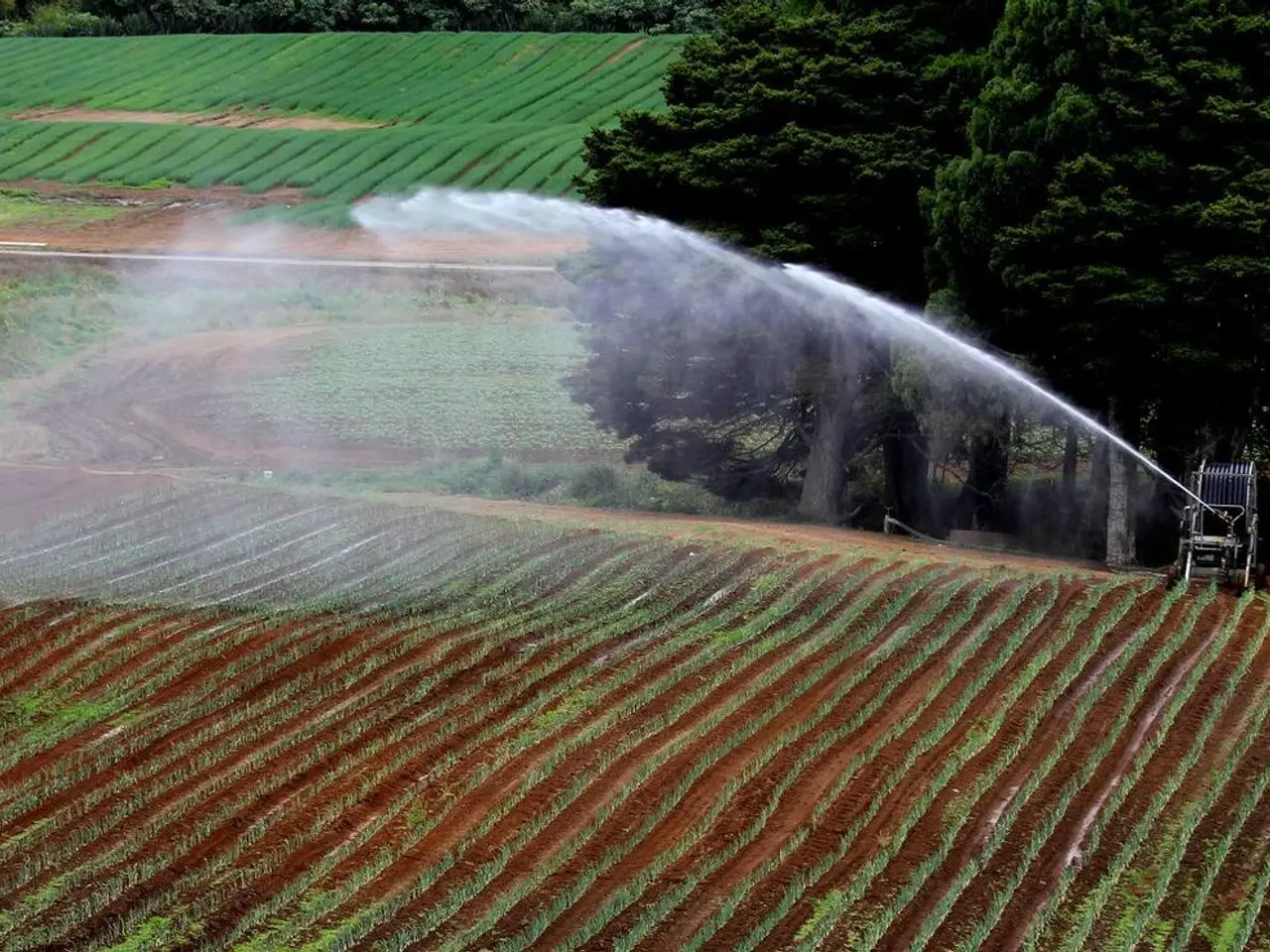Advantages of AI in Predictive Agriculture
In the realm of agriculture, small farmers are increasingly leveraging the power of Artificial Intelligence (AI) to compete effectively with larger operations. This innovative technology offers a multitude of benefits that enhance resource efficiency, decision-making, accessibility, productivity, and labor efficiency.
1. **Resource Optimization**
The use of AI in precision farming enables farmers to optimize the use of water, fertilizers, and pesticides, thereby reducing waste and minimizing environmental impact. By analysing soil conditions, weather forecasts, and crop health, AI systems help farmers apply these resources only where they are needed, leading to healthier crops and more sustainable farming practices[1][2]. This approach also results in cost savings, as farmers can reduce expenses associated with excessive use of fertilizers and pesticides[1][4].
2. **Real-Time Decision Making**
AI provides real-time insights on crop health, weather conditions, and potential threats, allowing farmers to respond quickly to pests, diseases, or adverse weather conditions, reducing crop damage and increasing yields[1][2]. Additionally, AI helps determine the ideal harvesting time based on weather trends and crop conditions, ensuring that produce is picked at its best quality and reducing waste[5].
3. **Accessibility and Scalability**
AI solutions are becoming more accessible to small farmers through affordable mobile apps and cloud-based platforms. These tools provide real-time insights and actionable advice on pest control, crop management, and weather forecasting[1][5]. Moreover, AI platforms are designed to be scalable, allowing small farmers to start with basic tools and expand as their operations grow[5].
4. **Increased Productivity and Competitiveness**
AI helps small farmers manage crops more effectively by monitoring growth, detecting diseases early, and optimizing growing conditions[3][5]. With AI-driven insights, small farmers can improve crop quality and timing, making them more competitive in the market and better equipped to handle logistics and supply chain challenges[5].
5. **Automation and Labor Efficiency**
AI-powered tools like self-driving tractors and robotic pickers can automate routine tasks, reducing manual labor needs and alleviating labor shortages[5].
In conclusion, AI in precision farming empowers small farmers by providing them with the data-driven insights and tools needed to optimize their operations, reduce costs, and improve productivity. By leveraging AI, small farmers can make informed decisions about crops, predict weather patterns, optimize irrigation schedules, and forecast yields, ultimately leading to increased competitiveness and a more sustainable future for farming communities.
[1] Precision Farming Technology Helps Farmers Apply Fertilizers and Water Only Where They Are Needed, Reducing Waste and Costs. (2021). Retrieved from https://www.agriculture.com/news/precision-farming-technology-helps-farmers-apply-fertilizers-and-water-only-where-they-are-needed-reducing-waste-and-costs
[2] Data Analytics Helps Farmers Predict Weather Patterns and Plan Planting Schedules. (2021). Retrieved from https://www.agriculture.com/news/data-analytics-helps-farmers-predict-weather-patterns-and-plan-planting-schedules
[3] AI Tools Help Small Farmers Make Better Decisions Without Needing a Large Budget. (2021). Retrieved from https://www.agriculture.com/news/ai-tools-help-small-farmers-make-better-decisions-without-needing-a-large-budget
[4] Drones Help Farmers Spot Problems Early, Like Pest Infestations or Nutrient Deficiencies. (2021). Retrieved from https://www.agriculture.com/news/drones-help-farmers-spot-problems-early-like-pest-infestations-or-nutrient-deficiencies
[5] Data Analytics Has Become a Valuable Tool for Farmers, Helping Them Make More Informed Decisions and Improve Their Yields. (2021). Retrieved from https://www.agriculture.com/news/data-analytics-has-become-a-valuable-tool-for-farmers-helping-them-make-more-informed-decisions-and-improve-their-yields
[6] Precision Irrigation Using AI Helps Farmers Conserve Water and Boost Crop Yield. (2021). Retrieved from https://www.agriculture.com/news/precision-irrigation-using-ai-helps-farmers-conserve-water-and-boost-crop-yield
[7] Machine Learning Is a Significant Part of How AI Works, Learning from Past Data to Make Better Decisions. (2021). Retrieved from https://www.agriculture.com/news/machine-learning-is-a-significant-part-of-how-ai-works-learning-from-past-data-to-make-better-decisions
[8] AI Systems Suggest Ways to Minimize Pesticide Use, Protecting the Environment and Keeping Crops Healthy. (2021). Retrieved from https://www.agriculture.com/news/ai-systems-suggest-ways-to-minimize-pesticide-use-protecting-the-environment-and-keeping-crops-healthy
[9] Artificial Intelligence Improves Weather Predictions for Farmers, Providing More Reliable Forecasts. (2021). Retrieved from https://www.agriculture.com/news/artificial-intelligence-improves-weather-predictions-for-farmers-providing-more-reliable-forecasts
[10] Data Analytics Can Help Farmers Make Better Choices About Which Crops to Plant Based on Specific Conditions. (2021). Retrieved from https://www.agriculture.com/news/data-analytics-can-help-farmers-make-better-choices-about-which-crops-to-plant-based-on-specific-conditions
[11] AI Can Predict Pest Outbreaks, Allowing Farmers to Act Before They Cause Damage. (2021). Retrieved from https://www.agriculture.com/news/ai-can-predict-pest-outbreaks-allowing-farmers-to-act-before-they-cause-damage
[12] The Use of Artificial Intelligence (AI) in Precision Farming Offers Several Specific Advantages for Small Farmers. (2021). Retrieved from https://www.agriculture.com/news/the-use-of-artificial-intelligence-ai-in-precision-farming-offers-several-specific-advantages-for-small-farmers
In the realm of precision farming, AI systems analyze data on weather forecasts, soil conditions, and crop health to suggest efficient usage of water, fertilizers, and pesticides, contributing to the optimization of resources (data-and-cloud-computing, technology). The adoption of AI in weather forecasting allows farmers to make real-time decisions concerning crop health, pests, diseases, and adverse weather conditions, leading to increased yields and labor efficiency (artificial-intelligence, weather-forecasting).




